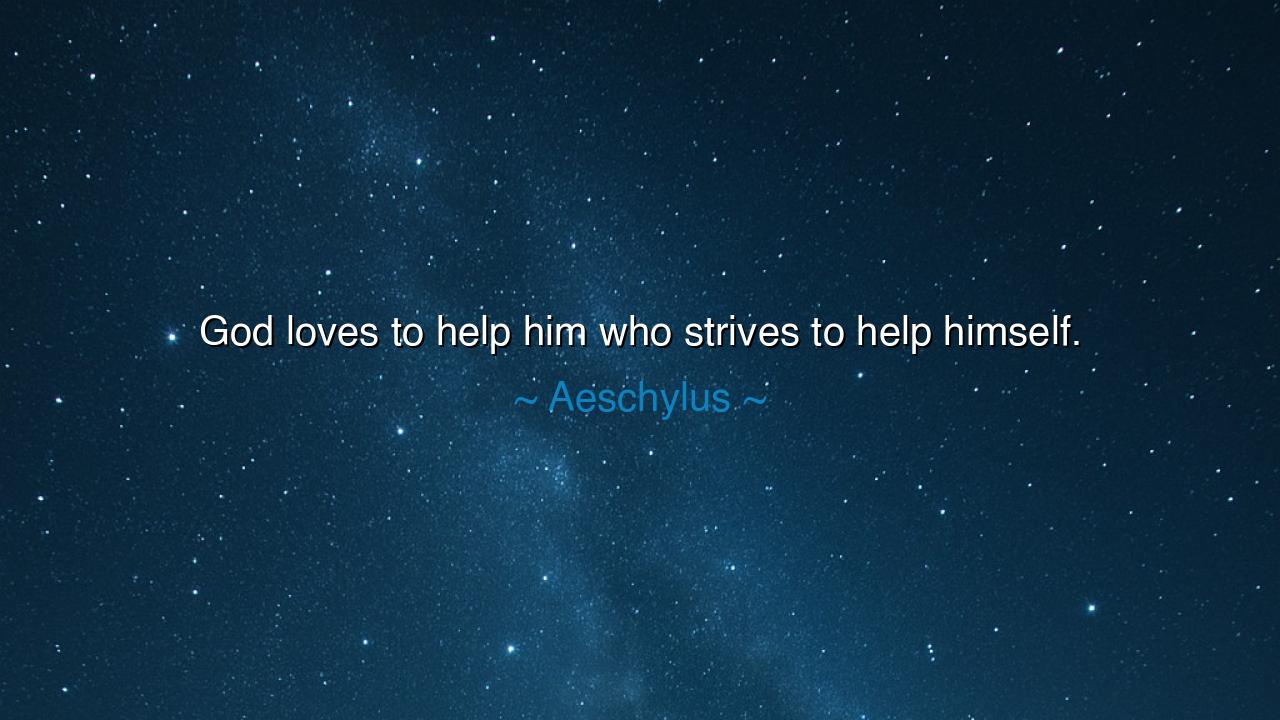
God loves to help him who strives to help himself.






“God loves to help him who strives to help himself.”
Thus declared Aeschylus, the father of Greek tragedy, a man who beheld both the grandeur and frailty of the human spirit. These words, though ancient, ring through the corridors of time like the voice of a prophet. In them lies a law as old as creation itself — that divine favor follows human effort, that heaven bends not to the idle but to the courageous. To strive is to honor the life given; to act with will and faith is to meet the gods halfway. For the universe moves in harmony with the soul that moves toward its purpose.
In the age of Aeschylus, men believed that fate ruled all, yet he — even amidst the solemn fatalism of Greek thought — dared to speak of human responsibility. His dramas, born from the struggles of kings and heroes, taught that man is not a leaf blown helplessly by destiny, but a living force capable of shaping his path through courage and discipline. Thus when he wrote, “God loves to help him who strives to help himself,” he meant that the divine spirit works not upon the slothful or the fearful, but through the hands and hearts of those who act with resolve. It is not enough to pray; one must labor. It is not enough to wish; one must rise and walk.
Consider the tale of Odysseus, the wanderer of Homer’s song. Cast upon stormy seas, betrayed by winds and gods alike, he did not sink into despair. Though he prayed to Athena for wisdom, he also built, fought, and endured. His salvation did not fall from the heavens; it came through his own perseverance, guided by divine grace. Had he waited idly for rescue, he would have perished. But because he strove, the gods helped him. His life was the living echo of Aeschylus’ truth: that heaven aids the man whose hands are not folded in defeat.
This teaching stands against the weakness of those who would use faith as an excuse for inaction. To sit and wait for fortune is to misunderstand the very nature of the divine. The gods — or call them by another name, Providence, Destiny, or the Spirit — favor not the passive soul but the active one. For action is prayer made visible. When a man rises from the dust, lifts his burden, and steps forward in hope, heaven itself leans nearer to him. The divine power is not a crutch for the indolent; it is the wind in the sails of the brave.
And yet, this truth is not without mercy. It does not demand perfection, only effort. The smallest act of courage, the quietest persistence against despair, stirs the eternal forces that dwell beyond sight. The farmer who tills his field though drought threatens, the mother who teaches her child though hardship looms, the thinker who searches for truth though the world mocks him — all these are seen by heaven, and heaven delights in them. For in their struggle shines the spark of the divine itself: the will to continue, to create, to hope.
So, my child of earth, remember this law: help yourself, and you will find that you are not alone. When you lift your hand to work, unseen hands will strengthen it. When you dare to begin, providence will meet you upon the road. But if you sit in fear or complaint, the gods cannot reach you, for their gifts are drawn to motion, not to stillness. Faith without effort is a song without sound, a flame without fuel. Strive — and in your striving, you will find both yourself and the favor of heaven.
Let your days, then, be filled with purposeful action. Rise each morning and ask not what the world will give you, but what you may build with your own spirit. Work with faith, labor with joy, and face each trial as an ally sent to awaken your strength. For the divine does not dwell in temples alone; it lives in the heart that dares. And when your will aligns with that higher power, you shall find what Aeschylus knew: that God loves to help him who strives to help himself — and that in that sacred striving lies the true glory of being alive.






AAdministratorAdministrator
Welcome, honored guests. Please leave a comment, we will respond soon